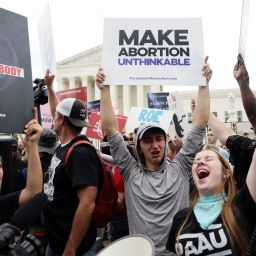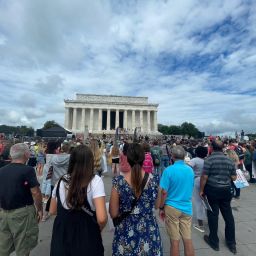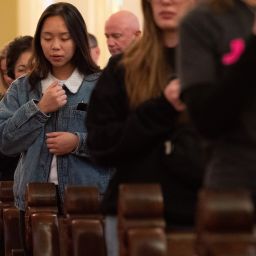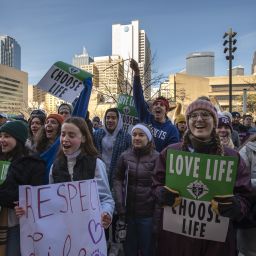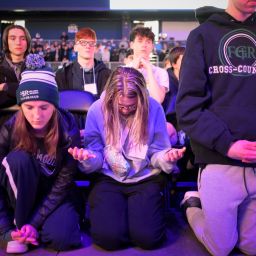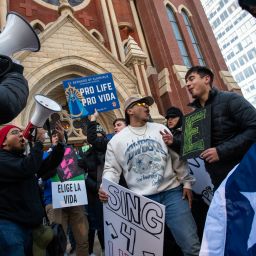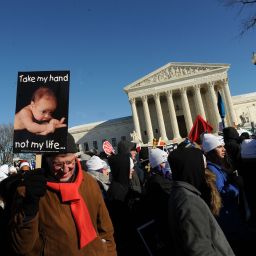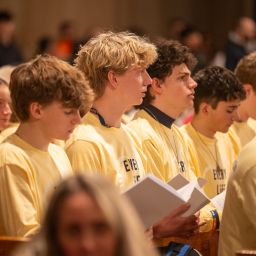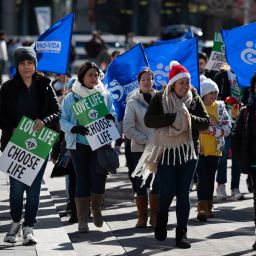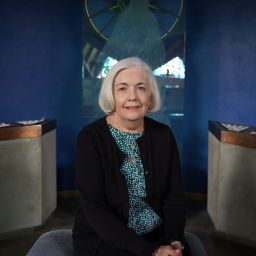
By Amy White
The Texas Catholic
For nearly half a century, pro-life advocates have demonstrated their support for life and their opposition to abortion through public marches—both nationally and locally. In north Texas, this tradition continues proudly, even after the landmark abortion case Roe v. Wade was overturned last year.
Fifty years ago, on Jan. 22, 1973, Roe v. Wade enshrined into law a constitutional right to abortion. The U.S. Supreme Court overturned the decision in June of last year with its majority decision in Dobbs v. Jackson Women’s Health Organization, finding that there is no constitutional right to abortion.
As a result, the abortion fight shifted from the national level to the state level. This shift has had a huge impact on abortion laws in Texas.
“After 49 years and countless prayers, the regulation of abortion was returned to the states,” said Geralyn Kaminsky, executive director of Catholic Pro-Life Community, the respect life ministry of the Diocese of Dallas. “Because of the foresight of the Texas legislature, in particular, the Human Life Protection Act—It was also called the Texas Trigger Ban—went into effect in our state in August 2022.”
The ban closed abortion centers throughout the Lone Star State and made facilitation of abortions within Texas punishable by fines and imprisonment. Similar but not identical trigger bans went into place in several other states, including Arkansas, Kentucky, and Tennessee.
“32,260 fewer abortions were performed in the United States in the first six months after that [Dobbs] ruling,” Kaminsky said, adding, “In 2022, the birth rate increased in Texas by 4.7%.”
The Texas legislature also increased funding to life-affirming abortion alternatives this session.
“[The Texas legislature] has given $100 million in the past. They increased it to $140 million,” Kaminsky said. “They provide funding for assistance for education, coordination of care, material goods, housing, and support through maternity homes to pregnancy care centers. So, our state is very pro-life.”
Local pro-life groups have also largely focused on connecting parents to life-affirming resources. Post-Dobbs, this effort has only intensified.
“Most pro-life groups are focused on helping a mom in an unexpected pregnancy, providing emotional and material support for her and her new baby,” Kaminsky said. “The number of moms coming to them for help has increased.”
The Catholic Pro-Life Community, for example, provides mentorship and support to women with unexpected pregnancies through its Project Gabriel ministry, an outreach to women facing unexpected pregnancies. The ministry’s GEMS (Gabriel Education Ministry and Support) program educates mothers on the skills necessary to care for themselves and their families and provides scholarships to graduates of the program.
The north Texas pro-life strategy is about connection—connecting parishes, local pro-life groups, and local charitable organizations to information resources, and connecting mothers to these groups.
Despite the ban of abortion in Texas and the efforts of pro-life groups to expand life-affirming resources, some Texans still seek abortions.
“There are still women crossing the state border into Kansas and into New Mexico. Lots of Texas license plates, we’re being told, are crossing over to get abortions,” Kaminsky said. “Anyone now performing illegal abortions in our state can be fined and imprisoned. That has not changed, however, women taking chemical abortion pills. It is illegal to mail pills, but people are finding a way.”
The struggle for a completely pro-life state is still ongoing, even within the Texas legislature.
“Even though this is an anti-abortion state,” said Frank Gonzales, director of marketing and communications at Catholic Pro-Life Community, “there’s still a lot of movement within the state to try to change the laws or change people’s minds, especially with the lawmakers.”
Marching for Life
Post-Dobbs, pro-life advocates continue to march.
The first national March for Life took place in 1974, a year after the Roe v. Wade decision. Now, with the overturning of Roe and the resulting decentralization of abortion laws, the March for Life is expanding its local, state marches.
Virginia, Georgia, and Colorado are among the states with upcoming marches.
The North Texas March for Life is on Saturday, Jan. 20, 2024. The day will include an 8:30 a.m. youth call to action event in the Grand Salon of The National Shrine Cathedral of Our Lady of Guadalupe in Dallas, then the annual Pro-Life Mass (formerly known as the Roe Memorial Mass) at 10 a.m. in the cathedral, followed by the North Texas March for Life. Participants in the march will gather at Ross and Pearl before marching to the rally location at Dallas City Hall.
Unlike the last several marches in north Texas, the upcoming North Texas March for Life will not end at the Earle Cabell Federal Building, where the Roe v. Wade case began. Instead, the march will conclude at Dallas City Hall. The new site was chosen in response to a resolution approved by the Dallas City Council in February to commemorate the city’s support for abortion rights.
“We believe that it’s inaccurate to say that the city—the citizens of Dallas—fully supports that resolution,” Gonzales explained.
The Pro-Life Mass and North Texas March for Life began in 2006 with an estimated 2,000 participants at the march, Gonzales said. Last year’s march drew 6,000 participants. The march organizers hope for at least that many participants this year.
The North Texas March for Life is sponsored by the Catholic Pro-Life Community, the Catholic Diocese of Fort Worth Respect Life Office, and Texans for Life Coalition.
“Just because abortion is illegal in Texas doesn’t mean we stop,” Kaminsky said. “We are promoting all life, from conception to natural death. We will continue to march.”

